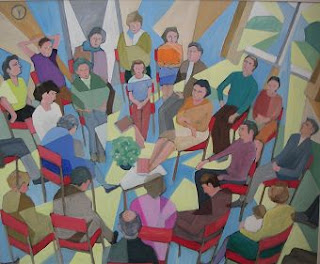 |
| Meeting by John Perkin |
First it may be useful to look at why ministers were first recorded. This practice arose in the UK in the18th century out of a problem (as so many Quaker practices have)! There were complaints that some people had represented themselves as ministers without the backing of a meeting and were travelling around the country asking for financial support in the places they visited when some of them were not even recognised as Friends. To deal with this a system was agreed whereby if a Friend was recognised by their meeting as having a particular gift for vocal ministry then their name was sent to the Yearly Meeting in London and 'recorded' in a book so that their qualification for support could be checked.
Not all recorded ministers travelled outside their local meetings but if they were moved to do so they had to obtain a certificate from their meeting which would be quite specific about where they might go. This certificate could be presented to the Friends they were travelling among to obtain hospitality and assistance in their journey, such as the provision of a guide and a horse, the expense of which could be claimed from the meeting visited if necessary. The practice was rooted in practicality as well as answering divine inspiration.
The impetus for recognising that a minister should be recorded always came from their meeting not from themselves. This was very far from a modern job application. Being called to the ministry was not a small undertaking as it could involve very arduous travel and prolonged absences from home and many ministers' journals contain accounts of long, anxious hesitation before a calling was acknowledged. Ministers did not act alone and usually travelled with a companion, another minister or a younger Friend. They were also answerable to their meetings and to their fellow ministers, some of whom were more encouraging than others. Samuel Bownas had experienced his own difficulties and in 1750 he published a self-help book A description of the qualifications necessary to a Gospel Minister which still has things to say to us today.
There was no initial intention to mark the recorded ministers out as superior, rather as people trying to be faithful to their calling. As time went on however in some cases the respect demanded for the calling could look to others like respect demanded for the person. In the mid-eighteenth century Catherine Payton Phillips was called 'a Great Autocratrix' by the young James Jenkins, although he was hardly an unbiased observer and in the nineteenth century James Bevan Braithwaite earned the nickname of 'the Quaker Bishop'!
Eventually in the early twentieth century it was felt that meetings had come to rely too much on recorded ministers and that if they were not present then no vocal ministry would be heard. There was a movement to share the responsibility for vocal ministry more equally between all members and in the UK the practice of recording ministers was officially discontinued in 1924. Since then not only have attitudes to recorded ministers changed but so has vocal ministry itself - in length, form and content - especially among 'liberal' Friends.
Part of the problem with reviving recorded ministry is that in the past ministers were recorded for life. It was possible to withdraw approval from ministers by refusing to issue them with certificates (as happened in the case of May Drummond) but this was rare. Indeed those Friends who had been recorded before 1924 in London Yearly Meeting remained officially ministers until they died and Neave Brayshaw in his book The Quakers mentions that they were qualified to attend Meeting for Sufferings in that capacity and that some were still doing so in the late 1940s and early 1950s!
The change to limited terms (usually triennial) for elders and overseers, who were also once appointed for life, has been a good and helpful reform which I don't think anyone would wish to go back on. Perhaps the way to look at any revival of recorded ministry is through a short-term, project-based approach. The Joseph Rowntree Quaker Fellowships were set up in this way by the Joseph Rowntree Charitable Trust. When I was a fellow in 1994-1995, touring the UK with workshops on spiritual autobiography, I resisted the description of what I was doing as 'travelling in the ministry' but perhaps I was wrong to reject the label so vehemently. I was not acting entirely independently as I was answerable to the trust, who supported me financially, and I also had a support group, drawn from my meeting and more widely, who gave me spiritual and emotional support, although not a certificate!
Lastly, I have also wondered whether blogging can be a kind of ministry. Here are some thoughts on Quaker blogging which I hesitantly shared ten years ago! I have aways seen my blog as an extension of my spiritual autobiography project. Should I only have to listen to readers' comments or should I be open to discipline from the meeting or from another support group? Is there a difference between a Quaker blogging and a Quaker blog? There are a lot of questions about recorded ministry still to be considered.

No comments:
Post a Comment